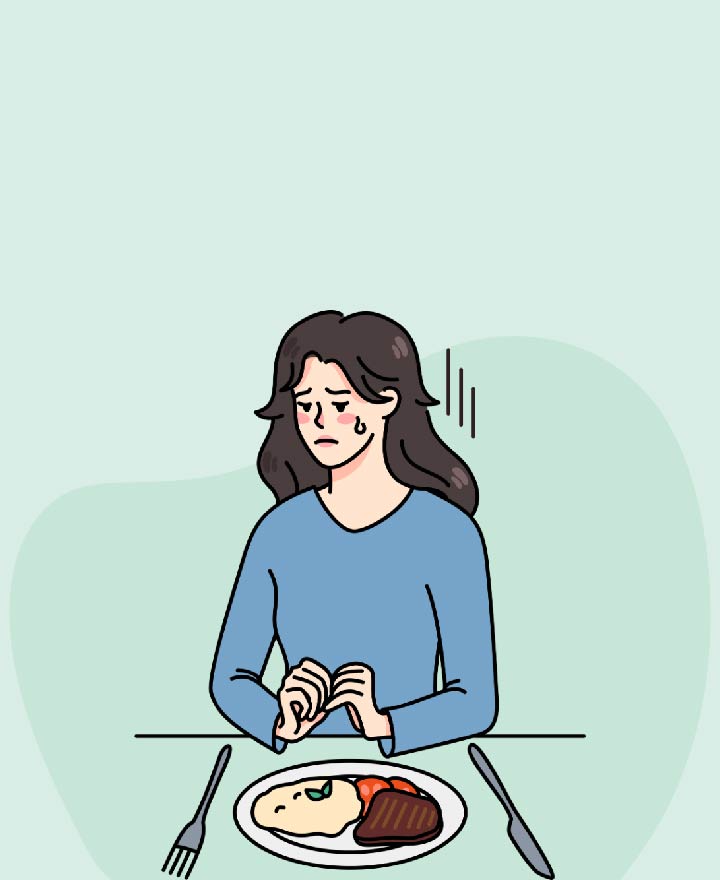

Everything You Need to Know About Disordered Eating
Disordered eating is a situation where you follow faulty eating habits which can lead to long-term health effects. Read on to know more.
What is Disordered Eating?
Disordered eating refers to a condition where you associate negative connections with the food you eat. It is not a medically diagnosed disease and is different from an eating disorder. However, a person with disordered eating is likely to develop eating disorders in future.
What exactly is a Disordered Eating Pattern?
On one end is healthy eating, or just regular old eating, and then all the way on the other side of extreme or unhealthy behaviors would be an eating disorder. Disordered eating would be somewhere in between.
Disordered Eating Habits
This may include:
• Avoiding entire food groups, certain macronutrients, or foods with specific textures or colours without a medical reason.
• Binge-eating.
• Engaging in compensatory behaviors, such as exercising to “make up for” food you’ve consumed.
• Exercising compulsively.
• Cutting food into small pieces, slowing down the pace of eating, or otherwise attempting to trick yourself into feeling fuller from less food.
• Fasting to lose weight.
• Feeling guilt, disgust, or anxiety before or after eating.
• Following strict food rules or rituals.
• Intentionally skipping meals or restricting food intake — including skipping meals before or after you’ve consumed a large meal.
• Participating in fad diets to lose weight.
• Using laxatives or making yourself vomit to control your weight.
• Weighing yourself or taking body measurements often.
Disordered Eating Vs. Eating Disorders
The distinction between them is in terms of regularity and intensity of the disordered behaviors. Eating disorders are believed to be more severe, and a person who suffers from this is more likely to engage in disordered behaviors, which can have a more negative effect on their physical health.
Who is Affected?
Majority of people have a disturbed relationship with food and to a large extent, disordered eating can affect most people, irrespective of age, gender, ethnicity or physical structure. Regardless of who they are or what they’ve been through, they are susceptible to disordered eating and eating disorders.
However, certain groups may be at a larger risk than others such as people with higher body weights, sexual minority adolescents, and people who identify as transgender.
Recovery
A dietician or a nutritionist is vital to the detection and treatment of disordered eating. Often, patients are unaware that their eating patterns are problematic or harmful but by working with a dietician and receiving counselling sessions can be helpful.
This is an important step in treating disordered eating and preventing it from progressing to an eating disorder.
Conclusion
Disordered eating is a serious health concern that may be difficult to detect since a person with disordered eating patterns may not display all of the classic symptoms typically identified with eating disorders. It's important to remember that even a person exhibiting disordered eating habits and behaviors also may be experiencing significant physical, emotional and mental stress.
One of the important components of our overall wellness is also being financially secured. Healthcare emergencies can happen any time, but a good health insurance can protect you from such uncertain situations. To know more about it, click here
Source: Healthline, VeryWellHealth, Healthspun
Disclaimer: This blog provides general information and discussions about health and related subjects. The information and other content provided in this blog, website or in any linked materials are not intended and should not be considered, or used as a substitute for, medical advice, diagnosis or treatment. Kindly contact your Doctor before starting a new medicine or health regime.
Related Articles
Signs and Symptoms That You May Be Under-Eating
What is Calorie Maintenance and Why Does it Matter?
Heart-Healthy Diet - Protect your Heart
Published on February 07, 2023

















 Health Insurance
Health Insurance  Travel Insurance
Travel Insurance  Car Insurance
Car Insurance  Cyber Insurance
Cyber Insurance  Critical Illness Insurance
Critical Illness Insurance
 Pet Insurance
Pet Insurance
 Bike/Two Wheeler Insurance
Bike/Two Wheeler Insurance  Home Insurance
Home Insurance  Third Party Vehicle Ins.
Third Party Vehicle Ins.  Tractor Insurance
Tractor Insurance  Goods Carrying Vehicle Ins.
Goods Carrying Vehicle Ins.  Passenger Carrying Vehicle Ins.
Passenger Carrying Vehicle Ins.  Compulsory Personal Accident Insurance
Compulsory Personal Accident Insurance  Travel Insurance
Travel Insurance  Rural
Rural